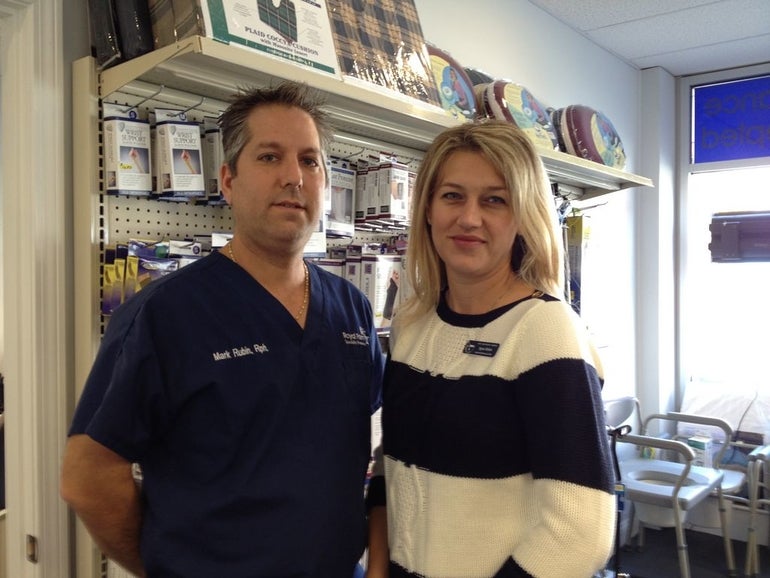With a wall of large windows facing Webster’s Main Street, Royal Palm Specialty Pharmacy was opened about a year and a half ago by pharmacist Mark Rubin’s wife, Agnes Rubin, after they relocated from Florida.
“Pharmacy is our passion,” said Rubin, a 22-year veteran of the field, as he sat inside the brightly-lit pharmacy on a recent afternoon.
He and Agnes, who is from Dudley, have a staff of 18 employees, and their pharmacy is one of 26 in the state licensed by the state’s Board of Pharmacy to operate as a compounding pharmacy.
Compounding is a niche in the medical industry that has been pushed into the spotlight after Framingham’s New England Compounding Center (NECC) was linked to a meningitis outbreak that has sickened more than 240 people and killed more than 20. NECC has shut down operations and recalled its products. It has been accused of operating as a mass manufacturer, which compounders cannot do.
Rubin is concerned that the alleged missteps of one compounder will negatively affect the industry as a whole, causing people to worry about using one.
But compounding pharmacies fill a need major drug manufacturers cannot. They’re able to step in when a drug company stops making medications that people still need and when patients need them in certain dosages or without certain ingredients like dyes, lactose or gluten. Patients and doctors also rely on compounders to change the form of medications. For example, if a patient can’t swallow a pill, compounders can make the medication in a liquid form.
“There are a lot of sensitivities (in medications) out there that people cannot take, and that’s where compounding comes into play,” said Saad Dinno, co-owner of Acton Pharmacy and two other pharmacies in Newton and Concord.
Small Part Of National Market
Until the 1950s, compounding pharmacies were the main way patients received prescriptions, before their numbers began diminishing as manufacturers began mass-producing medications. Today, the International Academy of Compounding Pharmacists (IACP) estimates that 1 to 3 percent of medications are provided by compounders that create patient-unique medications based on doctors’ prescriptions — two medications are rarely the same. They also provide medications for animals.
Local compounders say there’s an increase in orders for their medications as physicians learn more about them and what they can do.
“I would say it’s grown over the past five (or) six years because patients and physicians alike see a benefit to it,” said Dinno, 10 percent of whose business involves compounding. He said he works closely with physicians to develop the necessary treatment for a patient.
Demand For More Natural Treatments
Rubin, meanwhile, cited the recent movement to seek more natural treatments, such as bio-identical hormone replacement, as another reason for the increase in business.
Today, compounders create drugs that aren’t already available on the market, either because they’re specialized or unavailable from the manufacturer. “Over the past several years, compounding pharmacies have stepped in to assist patients, hospital and prescribers obtain medications which were in drug shortage or back-order situations due to manufacturing problems,” IACP Executive Vice President and CEO David Miller wrote in an email. “While that has been a traditional service provided by compounders, the number of drug-shortage problems faced by the U.S. health system in 2010 and 2011 is significant.”
According to the U.S. Food and Drug Administration, which tracks shortages, there were 178 shortages in 2010 and 251 in 2011. Currently, there are more than 120, and the FDA said it had helped prevent nearly 100 through August by working with manufacturers at the first signs of trouble.
Although the FDA is involved in compiling the shortage list of medications compounders can create, its overall lack of involvement in the industry has been criticized in the wake of the NECC case and others that have sickened and killed patients.
Congressional Action Urged
Madeleine Biondolillo, director of the Department of Public Health’s Bureau of Health Care Safety and Quality, and Deborah Autor, deputy commissioner for Global Regulatory Operations and Policy at the FDA, called for Congress to act to prevent similar instances in the future.
And, U.S. Rep. Edward J. Markey (D-Malden) released a statement saying he intends to introduce legislation that would address loopholes in federal oversight.
But those in the industry don’t believe more regulation is necessary.
“I think there (are) adequate regulations on the books right now,” Dinno said.
Rubin said there are enough regulations that the FDA doesn’t need to be further involved, but said he doesn’t typically hear of pharmacies being inspected.
That’s probably because, in Massachusetts, they weren’t. The state’s pharmacy board is responsible for overseeing compounding pharmacies, and according to a statement from the state’s Department of Public Health (DPH), the board is required to inspect pharmacies before granting initial licenses for operation. But although the board has the right to inspect pharmacies without notice, there have been no established annual inspection schedules like other states follow. The DPH said the pharmacy board “inspects upon receipt of complaints or during significant events, such as relocation or change of ownership.”
Miller, of the IACP, said that’s an unusual way of regulating.
The Massachusetts board “appears to be unique in not conducting regular, unannounced inspections of its permit and license holders,” he wrote. “Other state boards of pharmacy have regular, unannounced inspections of pharmacies.”
Patrick Acts, Announces Inspection Program
In the wake of the NECC investigation, Gov. Deval Patrick announced that protocol for the pharmacies will be brought more in-line with other states’ requirements. The pharmacy board will conduct unannounced inspections — at least annually — of compounding pharmacies that prepare injectable medications. The pharmacies will also be required to submit annual reports of production, volume and medication distribution, and report all interactions with federal regulatory authorities.
Image credit: FreeDigitalPhotos.net.
Read more
Framingham Firm Linked To Meningitis Outbreak Loses License
Compounding Center Probe Expands Into Westborough
Compounding Center’s License Revoked
Briefing: New England Compounding Center
State Officials Sift For Answers At NECC Hearing

